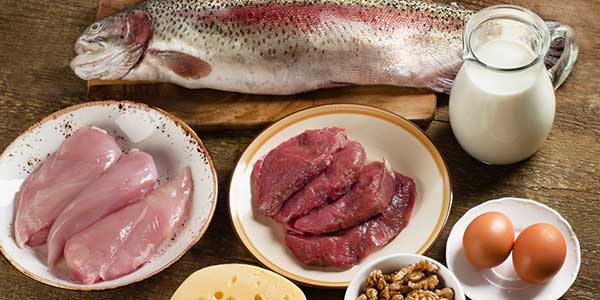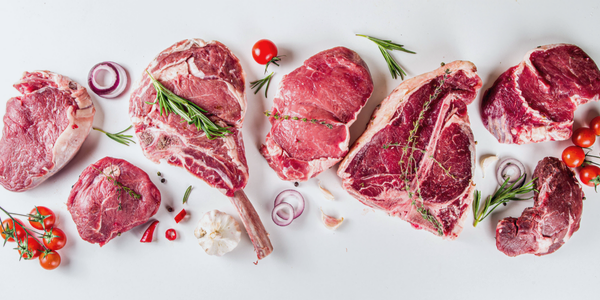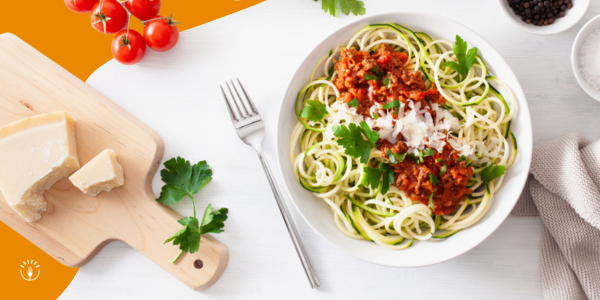
List of High-Protein Foods
1. Eggs
Whether scrambled, sunny side up, hardboiled, or in this bistroMD frittata recipe, eggs are high-protein, low calorie food. One large egg packs eight grams of protein for a mere 80 calories.
2. Chicken
Offering 21 grams of protein per three ounces, it really is unsurprising chicken continues its cherished reputation. Chicken is extremely versatile and can be enjoyed in numerous forms, including chicken feta meatballs, jerk chicken with mango salsa, a cranberry apple stuffed chicken breast, or grilled chicken pesto.
3. Beef Sirloin
Sirloin is considered one of the leanest cuts of beef and provides 23 grams of protein per three ounces. Additionally, selecting grass-fed beef products has shown to offer greater amounts of omega-3 fatty acids, a healthy fat that helps fight against inflammation, compared to grain and corn-fed products. Find more on the benefits of grass-fed beef here.
4. Ground Turkey
Although red meat can fit into a well-balanced diet, ground turkey is a beneficial alternative to beef and supplies 18 grams of protein per three ounces. In addition to this easy jalapeno turkey burger, add ground turkey to chili, soup, and tacos.
5. Tuna
Not only is canned tuna budget-friendly, but offers 14 grams of protein per two ounce serving! Tuna, along with salmon and halibut, are also rich in the omega-3 fatty acids, a healthy fat shown to benefit health. When selecting tuna, select a product soaking in water rather than salt and oil.
6. Greek Yogurt
There are many benefits of going Greek with yogurt supplies 15 grams for a typical 5.3-ounce container. But rather than consuming the large loads of added sugars most yogurts come with, opt for plain Greek yogurt and add natural sweetness and fiber with favorite fruits.
7. Cottage Cheese
Mostly known for its high calcium content, cottage cheese is also high in protein and packs on 13 grams per half cup! Cottage cheese has shown to be beneficial for weight loss, muscle recovery, bone support, and heart health.
8. Edamame
Also known as "young soybeans," a half cup of edamame delivers nine grams of protein and four grams of fiber. Edamame is considered a complete protein, providing all essential amino acids that must be included in the diet. Enjoy as a snack, mixed into Asian-inspired cuisine, or in this bistroMD unique edamole recipe.
9. Tempeh
Being produced from soybeans, tempeh is one of the best protein foods, especially for individuals reducing or completing cutting out animal products. One cup of tempeh supplies 31 grams of protein, while its soy-based relative (known as tofu) offers 20 grams.
10. Black Beans
Packed with 19 grams of protein and 14 grams of fiber per half cup, black beans are one of the best plant-based proteins to include in the diet. From a breakfast black bean omelet to its use in a healthier-for-you burrito bowl, black beans are nonetheless adaptable to various dishes and meals.
11. Nuts
Nuts such as almonds and cashews are not only a convenient snack, but offers an average of six grams per ounce. Along with contributing protein, nuts are also rich in healthy fats which further stimulates satiety until the next mealtime.
12. Whey Protein Powder
Though nutrition experts encourage whole foods over protein powders, they do have their time and place. Whey protein is further broken down into concentrate and isolate; concentrate provides between 30 to 80 percent of protein with varying amounts of fat and carb dependent on protein volume, while isolate is essentially a purer form of whey and is comprised with at least 90 percent of protein.
As a general guideline, the Recommended Daily Allowance (RDA) for men is 56 grams a day, while women are assigned to 46 grams. Age, activity level, injury and illness can also manipulate protein needs, though a dietitian can better guide you into how much protein you may require, along with recommending additional high-protein foods to best fit personal preferences and goals.







